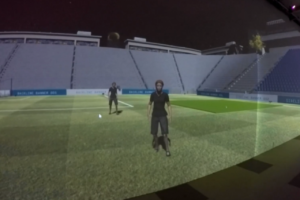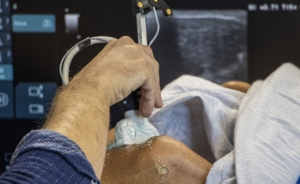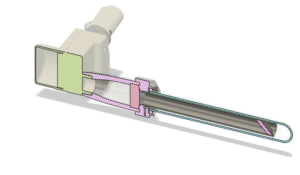Rewarded Take-off grants for Proof of Concept study
February 16, 2021Various projects within the Amsterdam knowledge institutions have received funding through a Take-off program from NWO. With this funding, they can further investigate the market opportunities for their products through a feasibility study.
- VROOM: A virtual 3D room to accelerate tactical sports training
Hoofdaanvrager: Dr. D.L. Mann, Vrije Universiteit Amsterdam
De ontwikkeling van atleten in teamsporten kunnen door het gebruik van virtuele trainingstools versneld worden. Vooral voor het verbeteren van tactische vaardigheden zijn virtuele trainingstools veelbelovend. In dit project wordt een virtual 3D room (VROOM)  ontwikkeld om tactische trainingen binnen het voetbal mogelijk te maken door een extended reality (XR) trainingstool die voetbalsituaties in een 3D-ruimte weergeeft. De VROOM volgt de positie van de voetballer en heeft aangepaste algoritmen waarmee computergegenereerde avatars in realtime met de atleet kunnen communiceren en biedt daarmee een interactieve geïndividualiseerde leeromgeving.
ontwikkeld om tactische trainingen binnen het voetbal mogelijk te maken door een extended reality (XR) trainingstool die voetbalsituaties in een 3D-ruimte weergeeft. De VROOM volgt de positie van de voetballer en heeft aangepaste algoritmen waarmee computergegenereerde avatars in realtime met de atleet kunnen communiceren en biedt daarmee een interactieve geïndividualiseerde leeromgeving.
- Soundtomics: Fast and cost-effective morphological soft-tissue assessment using 3D enhanced ultrasound
Hoofdaanvrager: Dr. R.T. Jaspers, Vrije Universiteit Amsterdam
Beeldvorming en het meten van organen en anatomische structuren is van groot belang voor een adequate diagnostiek en het kunnen volgen van effecten van behandelingen. Om dit goed te kunnen doen in het geval van spieren is de beschikbaarheid van een 3D image belangrijk. Dit is mogelijk met MRI, maar afgezien dat deze techniek te duur is voor bijvoorbeeld toepassing door een fysiotherapeut is er  ook een beperking aan de houding waarin gemeten kan worden. Het idee achter Sound Tomics is om dit te doen met behulp van een mobiel echografie apparaat. Standaard echografie levert echter alleen 2D afbeeldingen op. De groep van Richard Jaspers heeft een 3D echografie methode ontwikkeld waarmee een oplossing is gecreëerd door 2D-beelden in een 3D-beeldruimte te positioneren. Bekijk de video voor meer informatie.
ook een beperking aan de houding waarin gemeten kan worden. Het idee achter Sound Tomics is om dit te doen met behulp van een mobiel echografie apparaat. Standaard echografie levert echter alleen 2D afbeeldingen op. De groep van Richard Jaspers heeft een 3D echografie methode ontwikkeld waarmee een oplossing is gecreëerd door 2D-beelden in een 3D-beeldruimte te positioneren. Bekijk de video voor meer informatie.
- DIADELPH (Diagnostic Device for Pelvic Health)
Hoofdaanvrager: Prof. dr. D. Iannuzzi MBA, Vrije Universiteit Amsterdam
A team of researchers at VU Amsterdam, including Davide Iannuzzi (Professor of Biophotonics & Medical Imaging) and his former PhD student Luca Bartolini, is working on the DIADEPH project (also known as 2SIGNAL). They are developing an endoscope that can be used to image the cervix via a quick, cost effective, and non-invasive approach. This device obtains two known indicators of (pre)cancerous lesions: a subsurface 3D image of the cervix, and its stiffness. The new endoscope could function as a ‘filter’ in the screening process, helping to reduce the unnecessary biopsies by excluding (pre)cancerous lesions at an earlier stage. Moreover, if a biopsy is deemed necessary, this device may also be used to suggest the ideal sampling site.
In this video, Bartolini (the postdoctoral researcher at VU Amsterdam, co-inventor of the technique) summarizes the project as follows: “Our innovative medical device would improve the quality of life of millions of women that take part in cervical cancer screening programmes and reduce the physical, psychological and financial costs for them and society”.
 Davide Iannuzzi has also been awarded a Proof of Concept grant by the European Research Council (ERC), for the DIADEPH project. He plans to use this €150,000 research grant to explore ways of commercializing a new, non-invasive gynaecological device that can improve population screening for cervical cancer by excluding cancer before taking a biopsy. Read more
Davide Iannuzzi has also been awarded a Proof of Concept grant by the European Research Council (ERC), for the DIADEPH project. He plans to use this €150,000 research grant to explore ways of commercializing a new, non-invasive gynaecological device that can improve population screening for cervical cancer by excluding cancer before taking a biopsy. Read more
About Take off
Take-off, the funding instrument available to all scientific fields, encourages activity and entrepreneurship within the Dutch knowledge institutions. With this instrument, academic entrepreneurs – but also starters from universities of applied sciences (HBO) and starters who are making use of knowledge from institutions for Applied Research Organisations (TO2) – can bring their innovative research results to the market. Take-off is one of the instruments for knowledge utilisation which NWO implements together with ZonMw (The Netherlands Organisation for Health Research and Development).
Feasibility study
For a feasibility study, researchers within Take-off can request financing of EUR 20,000 to a maximum of EUR 40,000. This loan can be used to perform a feasibility study of the commercial application of innovative ideas and the start of activity on the basis of knowledge innovations from knowledge institutions. A feasibility study leads to a report which includes the possibilities of a start-up.
More news

Meet the DLAB team: Tana Antón García
A short introduction Tana is an open book. She really likes ducks, she is a yogi, a huge electronic music nerd, always dancing, she’s a science girl and a bit of a history fanatic – 3D printing busts of Augustus for fun and, much like him, bringing peace and vastly gaining popularity at the DLAB, just […]
News
Presenting the 28 pre-finalists of the Amsterdam Science & Innovation Awards 2025
Get to know the 28 pre-finalists of the Amsterdam Science & Innovation Award (AmSIA). The selected ideas offer solutions to a wide range of contemporary challenges, including (mental) health, climate, energy, nutrition, education, sports, and more.
News
EVENT > 12 March | Funding Routes
Discover your best funding options & connect with investors. This event is co-organized with AMS Startup Booster and will be held at the AMS Institute. Get your ticket: https://lu.ma/j0kfwcnb (Extra registration form for startups at the bottom of this page). Funding Routes – Demonstrator Lab x AMS Institute Join us for Funding Routes, an event […]
News